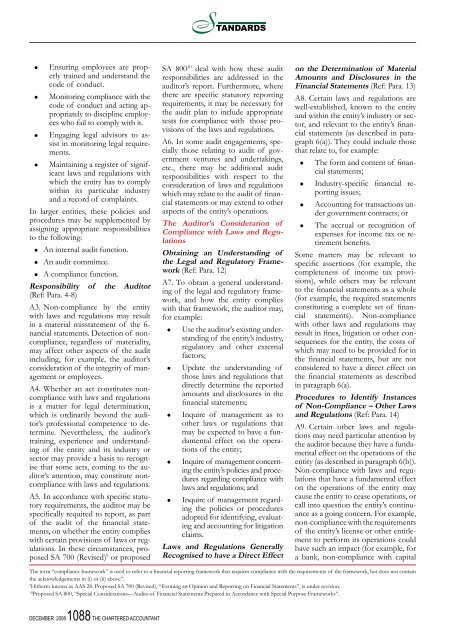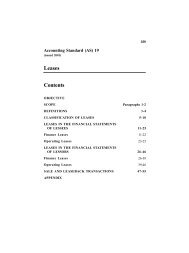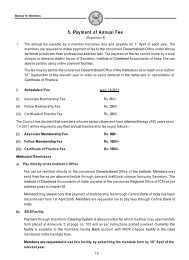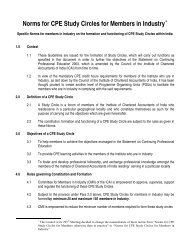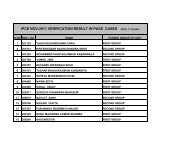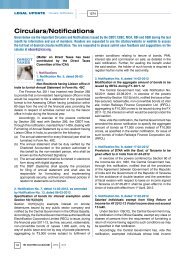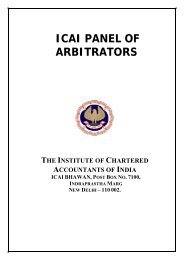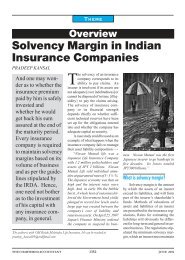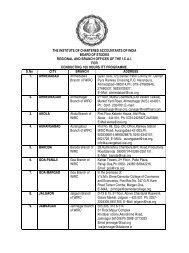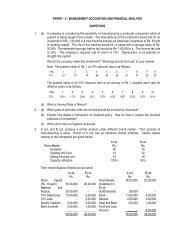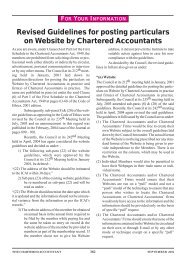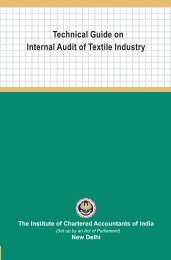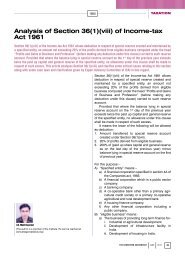The Chartered Accountant
The Chartered Accountant
The Chartered Accountant
You also want an ePaper? Increase the reach of your titles
YUMPU automatically turns print PDFs into web optimized ePapers that Google loves.
l Ensuring employees are properly<br />
trained and understand the<br />
code of conduct.<br />
l Monitoring compliance with the<br />
code of conduct and acting appropriately<br />
to discipline employees<br />
who fail to comply with it.<br />
l Engaging legal advisors to assist<br />
in monitoring legal requirements.<br />
l Maintaining a register of significant<br />
laws and regulations with<br />
which the entity has to comply<br />
within its particular industry<br />
and a record of complaints.<br />
In larger entities, these policies and<br />
procedures may be supplemented by<br />
assigning appropriate responsibilities<br />
to the following:<br />
l An internal audit function.<br />
l An audit committee.<br />
l A compliance function.<br />
Responsibility of the Auditor<br />
(Ref: Para. 4-8)<br />
A3. Non-compliance by the entity<br />
with laws and regulations may result<br />
in a material misstatement of the financial<br />
statements. Detection of noncompliance,<br />
regardless of materiality,<br />
may affect other aspects of the audit<br />
including, for example, the auditor’s<br />
consideration of the integrity of management<br />
or employees.<br />
A4. Whether an act constitutes noncompliance<br />
with laws and regulations<br />
is a matter for legal determination,<br />
which is ordinarily beyond the auditor’s<br />
professional competence to determine.<br />
Nevertheless, the auditor’s<br />
training, experience and understanding<br />
of the entity and its industry or<br />
sector may provide a basis to recognise<br />
that some acts, coming to the auditor’s<br />
attention, may constitute noncompliance<br />
with laws and regulations.<br />
A5. In accordance with specific statutory<br />
requirements, the auditor may be<br />
specifically required to report, as part<br />
of the audit of the financial statements,<br />
on whether the entity complies<br />
with certain provisions of laws or regulations.<br />
In these circumstances, proposed<br />
SA 700 (Revised) 9 or proposed<br />
DECEMBER 2008 1088 THE CHARTERED ACCOUNTANT<br />
STANDARDS<br />
SA 80010 deal with how these audit<br />
responsibilities are addressed in the<br />
auditor’s report. Furthermore, where<br />
there are specific statutory reporting<br />
requirements, it may be necessary for<br />
the audit plan to include appropriate<br />
tests for compliance with those provisions<br />
of the laws and regulations.<br />
A6. In some audit engagements, specially<br />
those relating to audit of government<br />
ventures and undertakings,<br />
etc., there may be additional audit<br />
responsibilities with respect to the<br />
consideration of laws and regulations<br />
which may relate to the audit of financial<br />
statements or may extend to other<br />
aspects of the entity’s operations.<br />
<strong>The</strong> Auditor’s Consideration of<br />
Compliance with Laws and Regulations<br />
Obtaining an Understanding of<br />
the Legal and Regulatory Framework<br />
(Ref: Para. 12)<br />
A7. To obtain a general understanding<br />
of the legal and regulatory framework,<br />
and how the entity complies<br />
with that framework, the auditor may,<br />
for example:<br />
l Use the auditor’s existing understanding<br />
of the entity’s industry,<br />
regulatory and other external<br />
factors;<br />
l Update the understanding of<br />
those laws and regulations that<br />
directly determine the reported<br />
amounts and disclosures in the<br />
financial statements;<br />
l Inquire of management as to<br />
other laws or regulations that<br />
may be expected to have a fundamental<br />
effect on the operations<br />
of the entity;<br />
l Inquire of management concerning<br />
the entity’s policies and procedures<br />
regarding compliance with<br />
laws and regulations; and<br />
l Inquire of management regarding<br />
the policies or procedures<br />
adopted for identifying, evaluating<br />
and accounting for litigation<br />
claims.<br />
Laws and Regulations Generally<br />
Recognised to have a Direct Effect<br />
on the Determination of Material<br />
Amounts and Disclosures in the<br />
Financial Statements (Ref: Para. 13)<br />
A8. Certain laws and regulations are<br />
well-established, known to the entity<br />
and within the entity’s industry or sector,<br />
and relevant to the entity’s financial<br />
statements (as described in paragraph<br />
6(a)). <strong>The</strong>y could include those<br />
that relate to, for example:<br />
l <strong>The</strong> form and content of financial<br />
statements;<br />
l Industry-specific financial reporting<br />
issues;<br />
l Accounting for transactions under<br />
government contracts; or<br />
l <strong>The</strong> accrual or recognition of<br />
expenses for income tax or retirement<br />
benefits.<br />
Some matters may be relevant to<br />
specific assertions (for example, the<br />
completeness of income tax provisions),<br />
while others may be relevant<br />
to the financial statements as a whole<br />
(for example, the required statements<br />
constituting a complete set of financial<br />
statements). Non-compliance<br />
with other laws and regulations may<br />
result in fines, litigation or other consequences<br />
for the entity, the costs of<br />
which may need to be provided for in<br />
the financial statements, but are not<br />
considered to have a direct effect on<br />
the financial statements as described<br />
in paragraph 6(a).<br />
Procedures to Identify Instances<br />
of Non-Compliance – Other Laws<br />
and Regulations (Ref: Para. 14)<br />
A9. Certain other laws and regulations<br />
may need particular attention by<br />
the auditor because they have a fundamental<br />
effect on the operations of the<br />
entity (as described in paragraph 6(b)).<br />
Non-compliance with laws and regulations<br />
that have a fundamental effect<br />
on the operations of the entity may<br />
cause the entity to cease operations, or<br />
call into question the entity’s continuance<br />
as a going concern. For example,<br />
non-compliance with the requirements<br />
of the entity’s license or other entitlement<br />
to perform its operations could<br />
have such an impact (for example, for<br />
a bank, non-compliance with capital<br />
<strong>The</strong> term “compliance framework” is used to refer to a financial reporting framework that requires compliance with the requirements of the framework, but does not contain<br />
the acknowledgements in (i) or (ii) above”.<br />
9 Hitherto known as AAS 28. Proposed SA 700 (Revised), “Forming an Opinion and Reporting on Financial Statements”, is under revision.<br />
10 Proposed SA 800, “Special Considerations—Audits of Financial Statements Prepared in Accordance with Special Purpose Frameworks”.


